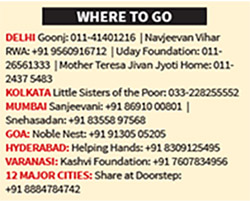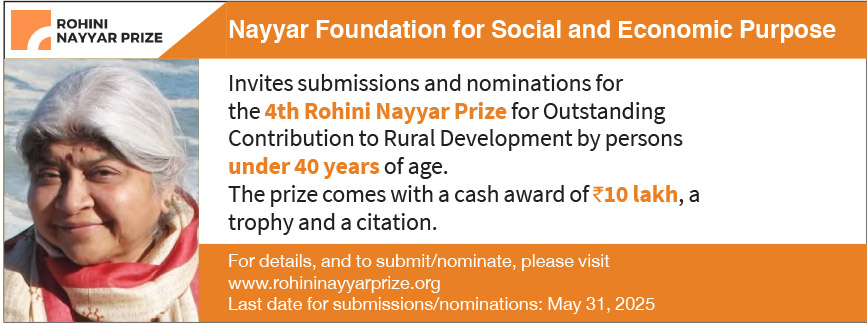
Sorting of clothes that arrive at Goonj in Delhi
Clothes piling up? Pass them on
WHEN Vineet Mehrotra lost his father in the Covid-19 pandemic, he grappled with intense grief. Adding to his depression was the overwhelming amount of decluttering he was confronted with, as his father’s only caretaker.
A month later, Mehrotra couldn’t put it off any longer. He began sorting out the piles of clothes that his father had left behind. He wanted to give them to someone who would use them well.
After asking around for a few days, he found the solution in Navjeevan Vihar, the colony in which he lives.
His colony’s Residents’ Welfare Association (RWA) had tied up with Why Waste Wednesdays Foundation, a non-profit, to collect worn clothes, shoes, stationery and other utility items. Why Waste Wednesdays passed on these items to other NGOs who ensured they reached those in need. He called them up and he was told to drop his carton of clothes at the Reduce, Reuse and Recycle Centre in the neighbourhood.
“It was a simple solution to what I felt was a complex and overwhelming problem,” he says, explaining how it was cathartic for him to see his father’s clothes being put to meaningful use.
There are similar organizations in different cities in India who ensure that pre-loved clothes end up in the hands of people who need them. We have curated a ready reckoner of a few non-profits who will pass on your used clothes to those who require them.
Donating a bundle of used clothes is a cumbersome exercise, unlike donating money online. Sending a jumble of clothes by courier is expensive — that’s why this kind of donation is best done hands-on. So fold your clothes neatly and drop them off yourself.
The biggest recycler of used clothes, and the best known, is Goonj, a social enterprise. Founded by Anshu Gupta in 1999 as an NGO, Goonj was built on the notion of dignity and not just charity. The word ‘donation’ has been replaced by the word ‘contribution’. Goonj launches collection drives and has set up dropping centres in many cities. It currently has 57 dropping centres across 15 states including Delhi, West Bengal, Uttarakhand, Bihar, Tamil Nadu, Maharashtra and Kerala."Whatever success Goonj has earned is due to the fact that we prioritize the receiver’s needs,” explains Gupta.
Not everything that is collected is wearable and so Goonj has to work with the items that come in and in the process add value and make them attractive and useful. The Goonj team has been curating marriage kits with bridal lehengas being made from the red chunnis that pile up during the Navratri festivities. Jeans that can no longer be worn are repurposed into vegetable bags and other items of everyday use.
In 2004, Goonj became one of the first organizations to break the silence around menstrual health. It began the Not Just a Piece of Cloth initiative, under which it makes its own sanitary napkins — My Pads. Cotton cloth is sifted, zips, buttons and pins are removed, the cloth pieces are disinfected, cut, filled with cotton fillers and finally stitched and packed in reusable cloth covers. For added safety, these are individually checked with magnets for any leftover metal pieces. In 10 years, Goonj has produced nine million units of My Pads.
“When you part with something you have previously owned, you need to be thankful to the person who is using it and is now the keeper of your emotions. Give only what you can still wear but choose not to,” is Gupta’s advice to contributors. While some clothes are in poor condition and add to Goonj’s workload, there are also those who give with compassion and dignity, cleaning their used clothes, packing them nicely. There are also elderly women who knit sweaters all year round and then, when winter sets in, give 40 to 50 of them in a bundle to Goonj.
In the past decade, Goonj has handled 63 million kg of material and created approximately 1.6 million person-days of work.
The Uday Foundation in New Delhi also accepts used clothes for distribution. Founded by Rahul Verma, the NGO functions from its small premises in Sarvodaya Enclave. You can drop off used clothes at their office between 10 am and 6 pm after giving them a call. They also accept unused medicines and healthcare equipment like wheelchairs, walkers and canes. Couriering your stuff from other cities is also possible.
Mother Teresa Jivan Jyoti Home, an orphanage tucked away in Delhi’s Mathura Road, is another destination for used clothes for children. Under the compassionate leadership of Sister Rosibel, supported by a team of 25 staff members, the orphanage is a loving home to children with no families. Clothes in good condition for the children are welcome. You will need to drop off the clothes yourself.
Other donations are also accepted. “I have been visiting the home once a year around my anniversary to donate grains, pulses and clothes for the children. The sisters are welcoming and even allow me to interact with the children whenever possible. I now encourage my friends and extended family to donate their clothes here too,” says Seema Joshi, a regular donor.
 |
In Mumbai, Sanjeevani–Life Beyond Cancer, an NGO dedicated to caring for cancer patients from an underprivileged background, also accepts second-hand clothes. Sanjeevani provides services to cancer patients, ranging from caregiver facilities, counselling to financial rehabilitation.
The idea of setting up multiple banks for clothes took shape when some members of the NGO’s team overheard a conversation between an impoverished cancer patient in tattered and dirty clothes and a doctor who was explaining the importance of personal hygiene.
The team began asking around for donations of clothes on social media and spread the word in the community. Sanjeevani’s first clothes bank was inaugurated at the Dr Bhubaneswar Barooah Cancer Institute in Assam just before the pandemic in 2018. “The idea is to assist patients while they navigate the entire spectrum of treatment and go from despair to rehabilitation. We do all we can to make the process less painful,” says Ruby Ahluwalia, a senior bureaucrat who started Sanjeevani after her own battle with cancer.
Snehasadan, which means ‘a home full of love’, also accepts used clothes for children. The NGO runs 12 shelter homes in the suburbs of Mumbai for homeless children. While the children come from diverse religious backgrounds, what is common to them is the struggle of surviving alone on the city’s busy and lonely streets.
The shelter homes accept clothes that are in good condition and encourage donors to come by and drop them at their office. Stationery items, educational material, groceries and essential utility items are also welcome. You need to call them beforehand before making a donation in kind. You can also connect with the children by celebrating your birthday with them at the home, making the day special for the donor and the children.
Noble Nest in Goa is an institution dedicated to the service of poor elderly women who have no family. Maria Merlyn Furtado set up the NGO in her own house at Navelim in 2021. Hers is a life devoted to service. She has worked for hospitals, churches and care homes. Visitors are welcome and clothes can be donated after getting in touch with them and to understand beforehand what items are needed most. They welcome donations from across the country. “A quaint, cozy pink and white house tucked away amidst Goan palms” is how Asha Mohan describes the structure as she saw it when she visited to make a donation. The exterior of Noble Nest is a testimony to what its name stands for, she confirms.
If you live in Hyderabad, Helping Hands, an NGO, has set up a Kapda Bank where you can donate your used garments. It has tied up with Siasat Daily, a local newspaper, and the Faiz-e-Aam Trust. Helping Hands collects used clothes in good condition, washes, irons and packs them and then donates them to the city’s poor families on a daily basis.
In the past, the NGO has distributed shoes and jackets to the boatmen of Dal Lake in Srinagar and to auto-drivers and push cart vendors in Hyderabad and Secunderabad. “To date, we have distributed about 56,000 outfits of clothes. We dispatched clothes to Jammu and Kashmir during a natural disaster and to Patna and Muzaffarnagar during communal riots,” says Shaik Akram, manager of Kapda Bank. He proudly explains that at any given time, the bank has more than 10,000 items of clothing. Apart from apparel, the bank stocks a vast collection of ladies’ purses, footwear, belts and toys. They prefer donors to visit their office to drop off pre-loved clothes, though they can arrange for a pick-up depending on your location within the city.
Little Sisters of the Poor is an international congregation founded in 1839. Their Kolkata division runs a shelter home dedicated to caring for the elderly poor and destitute. Over time, it has become a safe haven for the elderly who have no resources and no one to call their own. Food, clothing, shelter, medical care and recreation facilities are offered. They are happy to accept clothes and other essential items which can be discussed over the phone before paying a visit.
Kashvi Foundation, based in Varanasi, has been distributing clothes, food, books and utensils to underprivileged individuals and families for the past five years.
The NGO conducts monthly collection drives to facilitate the donation of pre-loved items, especially clothes. You can ask them to pick up your donation by seeing where their collection drives are being held on WhatsApp. The next step is to share pictures of the packed items. The pick-up will be scheduled accordingly. If donors happen to miss the drive dates (announced on Instagram), they can drop off their bundle at the NGO’s collection centre after a phone call.
There are similar initiatives that operate across multiple cities. Anushka Jain grew up watching her mother donate clothes on her birthday. As she grew older, she wondered why this was done only once a year and whether it was enough. She started Share at Doorstep, a social enterprise that aims to bridge the gap between donors and NGOs. As the name suggests, they arrange for convenient doorstep pick-up of pre-loved items across 12 major cities and also have courier pick-up options for others. All kinds of clothes, handbags, shoes, accessories and stationery items are accepted.
Begin your decluttering journey by passing on your used clothes to people who are in need of them. But make sure your clothes are still usable, and are suitable for the less fortunate. Give, but with dignity and sensitivity.
Comments
-

evita fernandez - April 13, 2025, 1:47 p.m.
Thank you for this well-written piece on the options we have with reference to "donating clothes". This has certainly helpedsolve my problem. Kudos to all the individuals who set up these organisations. May God touch more lives through their efforts.






